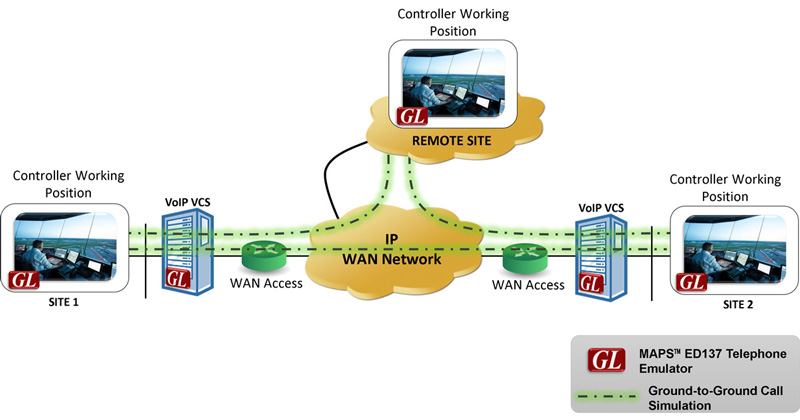MAPS™ ED137 Telephone Emulator for VoIP Air Traffic Management
Gaithersburg, Maryland, USA – Apr 1, 2021 - GL Communications Inc., a global leader in telecom test and measurement solutions, addressed the press regarding their voice communication solution MAPS™ ED137 Telephone for VoIP Air Traffic Management (ATM).

“Voice communications on ATM networks, whether it is Air-Ground (A-G) or Ground-Ground (G-G) calls, are being upgraded to use VoIP technology as per EUROCAE (European Organization for Civil Aviation Equipment) ED-137 inter-operability standards”, said Vijay Kulkarni CEO of GL Communications.
He further added, “GLs MAPS™ ED-137 Telephone can simulate G-G calls as per EUROCAE ED-137B Volume 2 and ED-137C Volume 2 Telephone standards. The software provides complete control over call scenarios and the ability to customize network parameters for signaling and VoIP traffic”.
- Generate more than 500 simultaneous calls
- Simulate hundreds of user agents from a single node
- Simulate the functions of Controller Working Position (CWP) entities in G-G telephone calls
Important Features
- Portable, easy to configure and use during in-the-field installation, system configuration/ test, and commissioning
- Supported call types include Instantaneous Access, Priority Direct/Indirect Access, Routine Tactical Direct/Indirect Access, Routine Strategic Direct/Indirect Access, Routine General Purpose Direct/Indirect Access, and Position Monitoring (Combined A-G and G-G, A-G only, and G-G only) calls
- Simulates different call scenarios like Call Hold, Call Transfer (attended and unattended), Call Pick-up, etc
- Depicts easy to understand Call Flow Graphs of SIP message exchanges and displays message contents (SIP headers and SDP attributes)
- Allows call rejection through the use of SIP error codes (4xx, 5xx, 6xx)
- RTP Traffic can be impaired with packet loss, latency, duplicated and out-of-sequence packets
- Supports hundreds of simultaneous calls for load testing
- Allows the user to define DSCP (Differentiated Service Code Point) values for signaling and voice traffic
- Supports complete customization of SDP and SIP headers, call flow, and messages
- Supports both UDP and TCP (over IPv4 or IPv6)
- Tests can be run sequentially, randomly, or simultaneously for multiple iterations
- Run sets of test cases automatically at a predefined time with a Scheduler feature
- Supports IP address spoofing for each endpoint to generate calls using a unique IP address from a single system
- Supports audio codecs such as G711 U-Law, A-Law, and G729
 Back to Press Releases Index Page
Back to Press Releases Index Page